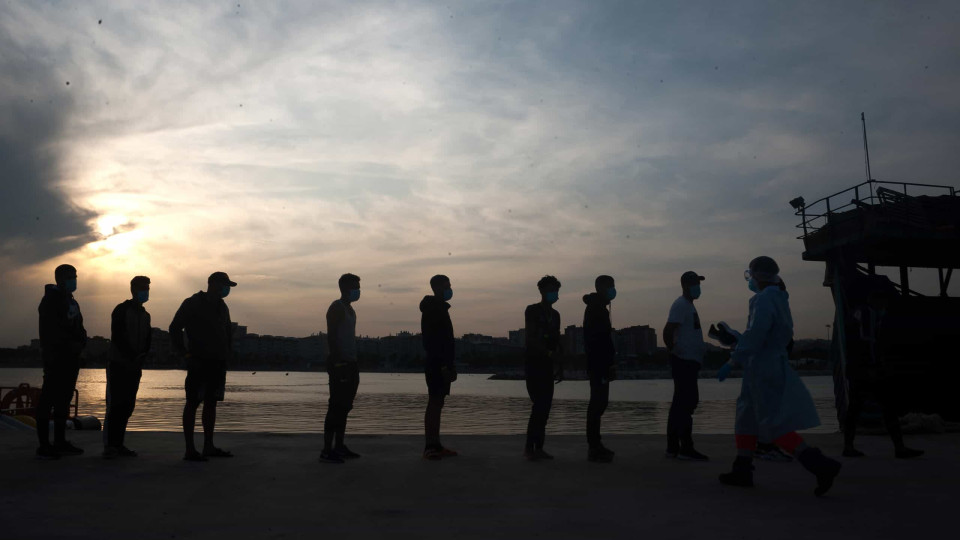Migration in the spotlight in European elections, but experts reject the idea of a crisis
The issue of migration to Europe has become a key factor in the run-up to June’s European Parliament elections, but several experts argue that calling the situation a “crisis” plays into the hands of parties seeking to win votes.

© Getty Images

Mundo Migrações
Hein de Haas, a Dutch sociologist and geographer whose research focuses on migration, considers the idea that there is a global migration crisis to be "a myth that needs to be denounced."
"The relative level of migration has remained stable worldwide for decades: about 3% of the world's population are migrants," he says in the book "How Migration Really Works", presented in April in Portugal.
According to this expert, it is necessary to end the "myth number one" of the migration issue.
"There is no mass global migration. Political parties eagerly exploit the assumption that there is a global migration crisis," he stressed in an interview with the Dutch newspaper Folia.
"Immigration levels vary mainly with a country's economic growth and labor shortages. The level of long-term refugee migration also remains stable at around 0.3% of the world's population," he assures.
"When a war breaks out, as happened a decade ago in Syria or recently in Ukraine, there is an occasional large influx of refugees. But in the long run, both globally and locally, there is no increase in refugee migration," the expert assures.
The idea that we are experiencing a crisis is, for Hein de Haas, just a concept created by political parties and movements.
"The political left often shouts: yes, we must avoid conflicts, provide development aid and combat climate change. The right shouts that we must close the borders even more and control them more strictly," but "global migration rates have remained relatively stable for decades and there is no migration crisis," he believes.
Last September, when newspapers across Europe announced an unprecedented migration crisis due to an increase in migrant arrivals on the small Italian island of Lampedusa, some analysts contradicted the concept.
"It is a typical case of demagogy, especially right-wing populism," said sociologist Maurizio Ambrosini of the University of Milan, arguing that it is necessary to "overcome dramatic speculation and adopt a more pragmatic policy."
Faced with the disembarkation of around 10,000 migrants in Lampedusa in just three days, the Prime Minister of Italy's right-wing and far-right coalition government, Giorgia Meloni, evoked the existence of a migrant crisis in the country, demanding solidarity from the European Union and its Member States.
The alarm situation was considered "absurd" by the president of the French Fraternity, an organization that fights against hate speech.
"In three months, last year, Europe welcomed four million Ukrainians without anyone crying out about a migratory invasion. Classifying the entry of a few thousand people into a country as a "migratory submersion" -- as the leader of the far right in France, Marine le Pen, did -- is absurd," stressed Pierre Henry.
Migration geographer Camille Schmoll also considered, in statements to the French media, that the Italian narrative was an exaggeration.
"There is no migratory overload. We are talking about very few people, on the scale of the world's major host countries," she said, adding that Turkey hosts 3.6 million refugees and Iran more than three million.
"We focus on Lampedusa because the images are impressive and because there is a phenomenon of 'hypervisibility' linked to the fact that the island is small and the reception center is overloaded," she said.
In 2011, 60,000 people entered the island in a few months.
By "deliberately" creating a scenario of permanent congestion, the Italian government "manages to transform this reception [of migrants] into a crisis," argued the author of the book "Migrations in the Mediterranean" and director of studies at the School of Advanced Studies in Social Sciences.
"These maritime episodes have become a propaganda tool" for the far right, which allows "to feed the rhetoric of fear," said geographer Camille Schmoll.
In terms of numbers, "we could very well absorb them in Europe with better coordination," she argued.
The instrumentalization is fueled by "a racist argument that accompanies spectacular images but that does not reveal the reality of migratory flows," said Pierre Henry.
Read Also: Cabo Verde launches Migration Observatory in the capital and on the Internet (Portuguese version)


Descarregue a nossa App gratuita.
Oitavo ano consecutivo Escolha do Consumidor para Imprensa Online e eleito o produto do ano 2024.
* Estudo da e Netsonda, nov. e dez. 2023 produtodoano- pt.com



